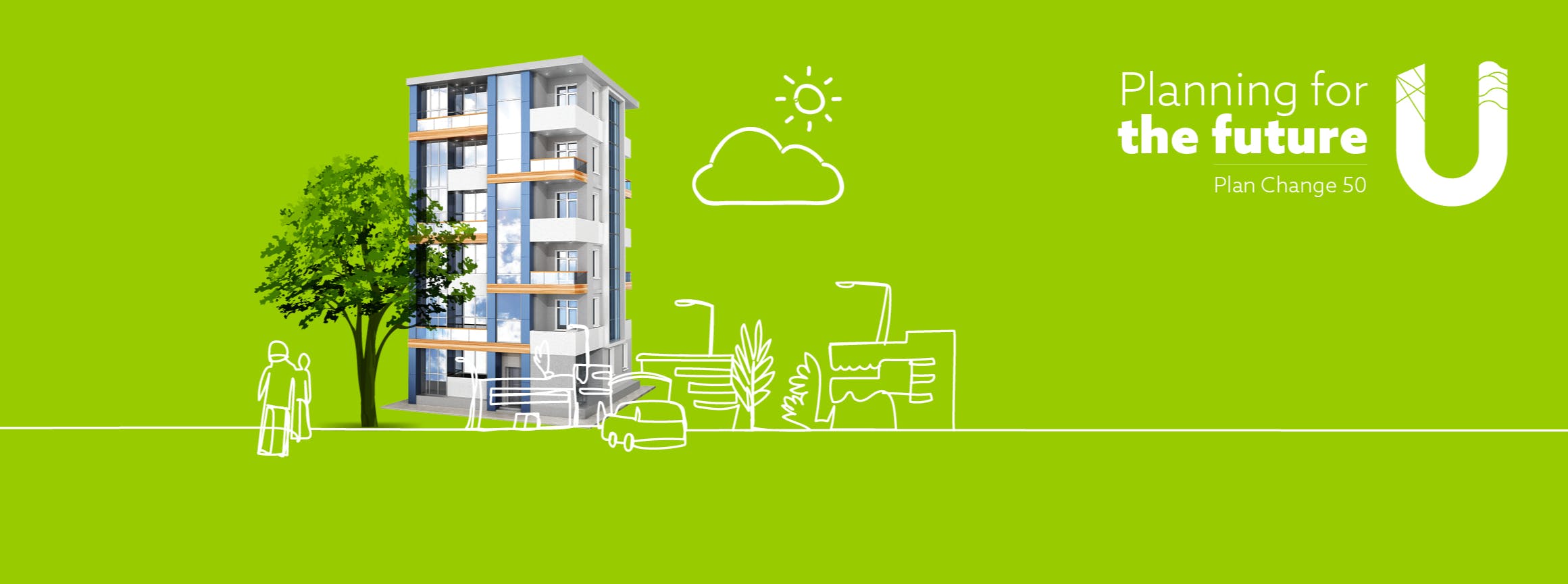Draft Plan Change 50 - 2021 Engagement
The informal feedback phase for Plan Change 50 closed on 13 September 2021. For more information about the next steps go to upperhuttcity.com/pc50
Public feedback is now closed after being open from 23 July to 13 September 2021.
PLEASE NOTE: This is different to the current PC50 - Rural Review which you can find here
You can stay up--to-date with the latest information on our Facebook page, @upperhuttcitycouncil.
Upper Hutt is experiencing huge growth – which is great for our city.
But there is going to be a big shortfall of homes if we don’t change the way we do things when it comes to planning for growth.
Over the last two and a half years we’ve been working through a review of the residential and rural chapters of our District Plan to see how we might be able to accommodate more growth – Plan Change 50.
That, along with the Government’s National Policy Statement on Urban Development which directs us to enable greater housing supply, means we are proposing some big changes to the way we do things.
Before we go through a formal consultation process, we want to share our draft proposals with you and get your feedback, to improve the quality of our final proposals.
Key changes include:
- Reducing the proportion of suburban residential zone by 50%.
- Creating a High Density zone within walkable areas to urban railway stations and the CBD (Central Business District) boundary from Silverstream to Clouston Park – enabling at least six storey residential development.
- Medium Density zones introduced as buffer between High Density and suburban areas, enabling up to four storey developments, easing the transition to High Density
- Medium Density clusters introduced in Brentwood/Trentham, Totara Park, Clouston Park, and Brown Owl.
- Enabling the construction of a second dwelling on most residentially zoned sites.
- Reprioritsing housing over land by enabling subdivision around any existing or proposed dwelling without any minimum lot size.
- Creating provisions to enable Papakāinga and communal housing options to improve housing accessibility.
- Generally intensifying residential zones, while protecting distinct character areas.
- Reviewing standards for other activities undertaken in residential areas, such as home businesses, visitor accommodation, early childcare facilities, and rest homes.
- Establishing settlement zoning throughout the Maymorn area, including a Settlement Zone over most of the Gabites Farm Block.
- Introducing enabling controls to help establish a centre for the local rural community near Wallaceville Church and around the Maymorn Station.
- Enablement of rural businesses that build upon our great outdoor environment.
- Rural lifestyle areas generally moving to foothills, where easily accessible to urban areas, protecting the openness and productive value of the valley floor.
- Protection of all high class soils in rural areas through an increase in minimum subdivision standards, while enabling key settlement areas previously identified.
- Introduction of many landscape-oriented controls in the rural environment to protect this sensitive area.
The draft proposals for PC50 does not include the Southern Growth Area (Pinehaven Hills).
Drop a pin
We know most of you will be interested in the proposed zoning changes, so to make it easy for you to see how you could be affected, click on the map below and use our interactive Drop a Pin map (or click here).
We’re also seeking your feedback on proposed changes to things like:
- How we plan to protect character areas from overdevelopment
- How we can make subdividing more flexible
- How we can offer great housing choice and diversity
- How we can develop sustainably.
You’ll find all the information you need, including fact sheets for each of the proposed zoning changes, in the Supporting Information section.
Please remember, this feedback phase is what we call informal engagement. We do this to make sure we test our thinking with the people it affects before the proposal is finalised.
There have been two informal engagement phases so far, in early and late 2020. You can find out more at upperhuttcity.com/pc50.
Next steps
This is the final opportunity to share your views before the proposal is formally released for consultation in mid-2022.
One important thing to remember when you’re looking at the proposed zoning changes is that this is a multi-generational plan. The intensification won’t happen overnight, we expect it could take between 30 and 50 years until we see this kind of development at scale.
But like every other Council in the country, we must plan for our future, and this is how we propose to accommodate growth.
So, have a read through the information that supports the draft proposal.
The supporting information, including Objectives, Policies and Rules, Fact Sheets, and FAQs, is available on the right of this page (or below if you're on a mobile device).
Your feedback
Tell us what you think. Share your feedback using the forms below.
How do you see the future?
Feedback closed at 5pm on Monday 13 September 2021.







